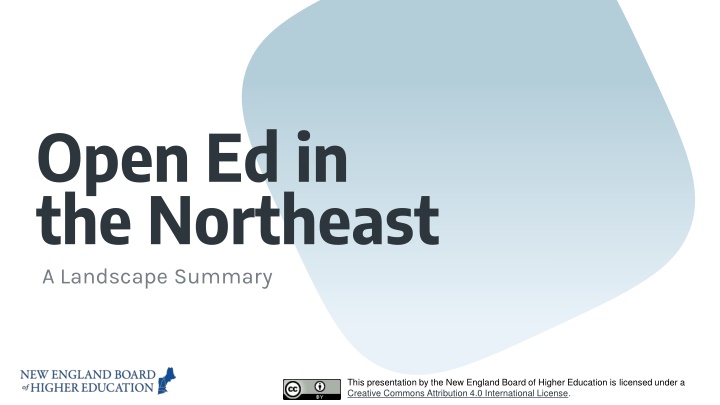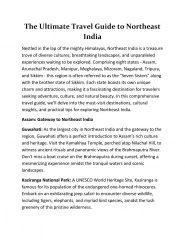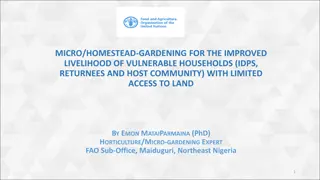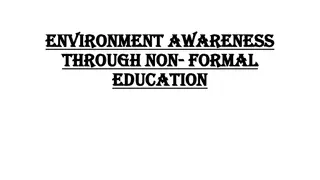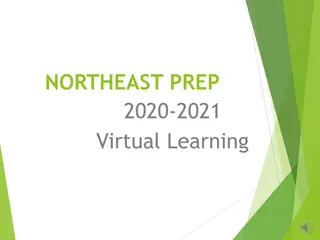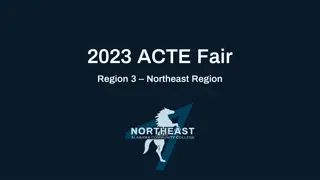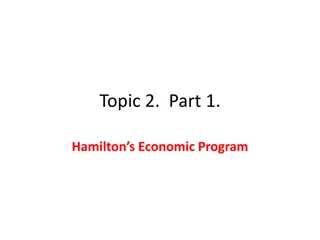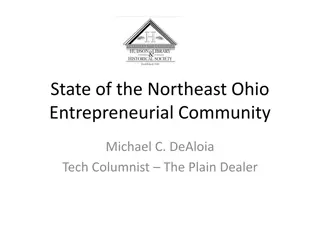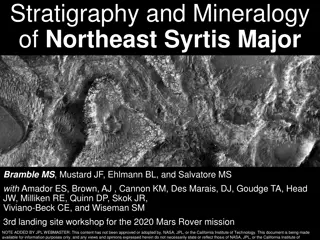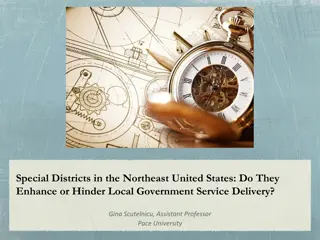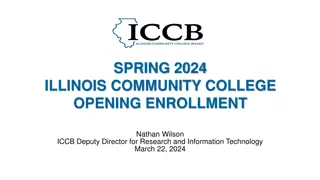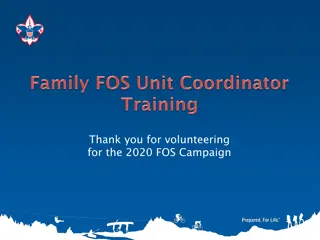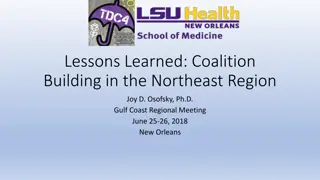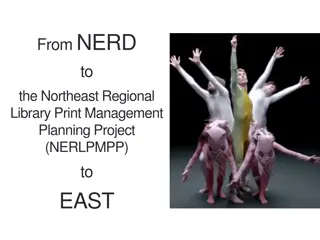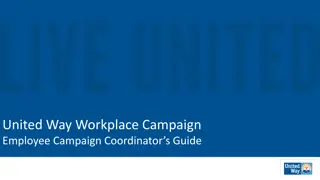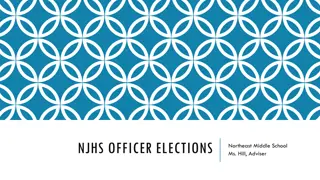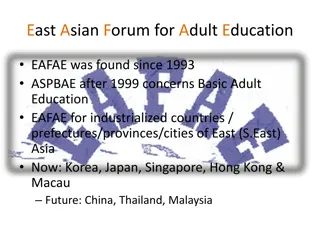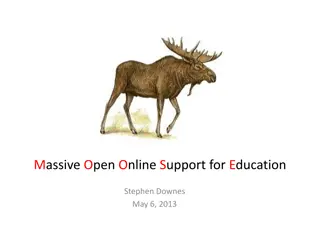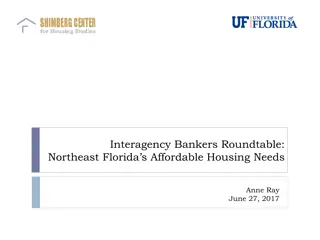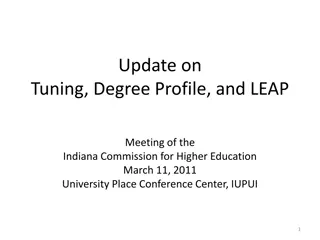Open Education Initiatives in the Northeast Landscape
This presentation by the New England Board of Higher Education delves into the establishment of regional compacts in higher education, outlining their structure, functions, and goals. It further explains the role of NEBHE in developing policies, resources, and support for Open Education initiatives in the Northeast region.
Download Presentation

Please find below an Image/Link to download the presentation.
The content on the website is provided AS IS for your information and personal use only. It may not be sold, licensed, or shared on other websites without obtaining consent from the author.If you encounter any issues during the download, it is possible that the publisher has removed the file from their server.
You are allowed to download the files provided on this website for personal or commercial use, subject to the condition that they are used lawfully. All files are the property of their respective owners.
The content on the website is provided AS IS for your information and personal use only. It may not be sold, licensed, or shared on other websites without obtaining consent from the author.
E N D
Presentation Transcript
Open Ed in the Northeast A Landscape Summary This presentation by the New England Board of Higher Education is licensed under a Creative Commons Attribution 4.0 International License.
What is a regional compact? Higher Education compacts have board members, delegates, or commissioners Created to improve education in the member states Boards and commissioners advise the work of the compact staff This slide was adapted with permission from Wanda Barker s What is a Regional Compact?
What does one do? Analyze and Publish Data, research, best practices Convene & Engage Decision-makers in education, business and government Support Action In states and schools, policy, and practice This slide was adapted with permission from Wanda Barker s What is a Regional Compact?
What is NEBHE doing? Under the direction of its Open Education Advisory Committee (est. Fall 2019), comprised of higher ed leaders representing the six New England states, New Jersey, and New York, NEBHE has begun its initial work to address the following identified priorities and coordinated actions:
What is NEBHE doing? Policy Development Resources and information to inform sound policy making practices for OER state legislation as well as system and institutional policies, bridging the gap between practitioners and key decision-makers. Action items Plan and deliver a summit of OER 101 for key policy makers. Collate and tailor a policy maker toolkit for legislators and senior leadership in the Northeast.
What is NEBHE doing? Policy Development Resources and information to inform sound policy making practices for OER state legislation as well as system and institutional policies, bridging the gap between practitioners and key decision-makers. Action item (in response to COVID-19) Drafting a regional report with suggested best practices & recommendations Forward w/ data & research Practitioner highlights - boots on the ground perspective, lessons learned Readiness checklist
What is NEBHE doing? Practitioner Support Resources to support practitioners in the Northeast when considering the practical realities of OER adoption, revision and creation and Open Pedagogy. Action items Identify an appropriate infrastructure to support communities of practice and resource sharing. Consult the Advisory Committee to help prioritize a regional training(s) that NEBHE can support or partner in offering.
What is NEBHE doing? Leadership awareness & engagement Communication strategies and tools to assist constituents in understanding and articulating the full value and commitment that Open Education entails in terms of advancing affordability, equity, and pedagogy in the Northeast. Action item Establish a clearinghouse on nebhe.org to keep the region s stakeholders and practitioners up-to-date on national, regional, and local efforts, conversations, and best practices in Open Education.
Regional Higher Educational Compacts Hewlett planning grant The 4 national compacts (NEBHE, SREB, MHEC, WICHE) in collaboration with WCET (WICHE Cooperative for Educational Technologies) received a planning grant from the William and Flora Hewlett Foundation in Fall 2019 to conduct a gap analysis and landscape summary on Open Education in the United States. Compacts convened in March 2019 and conducted national focus groups with accreditors and leaders in the national Open Ed space Leading organizations were invited to share their current areas of focus, challenges, and needs. (SPARC, OTN, DOERS3, CCCOER, & HBCU OER Network)
Policy, Leadership & Highlights Open Education Efforts in the Northeast
Connecticut Legislative action HB 7424 was enacted in 2019 establishing the Connecticut OER Coordinating Council under the Office of Higher Education. The 17-member council, chaired by Kevin Corcoran, Executive Director of Digital Learning for the Connecticut State Colleges and Universities System was convened for the first time in mid-September 2019 with an agenda to identify high-impact courses and facilitate a competitive grant program for higher education faculty in the state to develop, convert or adopt OER. State investment: $75,000 specified for OER grants Connecticut is a #GoOpen State Institution highlight Connecticut State Colleges and Universities (CSCU) #NoLo (No and Low cost > $40) Campaign easily allows students to identify which courses offer low or no-cost course materials. CSCU is also a member of the the DOERS3.
Maine Overview of work In 2011 the Maine Department of Education provided funding for Open Education Resource (OER) research through Title IID Enhancing Education Technology ARRA competitive grants. The grants supported the work of teacher research teams in the identification of high quality online educational resources that support and enhance classroom learning. (Mostly K-12) While Maine has not invested much in OER since 2011, the state s grassroots efforts have been active and quickly expanding. Institution highlight In 2017, Thomas College received a grant from the Davis Educational Foundation to redesign 30 courses using OER. USM offered a summer 2019 faculty training to learn more about OER, adopt an open textbook and revise their course. Stipends were provided by the Provost and USM Libraries.
Massachusetts Overview of work OER Working Group comprised of faculty, librarians, administrators; external membership (e.g., campus bookstore, union leadership, employer representative) Tasked with studying, evaluating and identifying ways that the MA Department of Higher Education can address public higher education Big Three goals of increasing access and affordability, closing achievement gaps, and increasing completion rates through broader utilization of OER, among others. In October 2019 the OER Working Group OER Report & Recommendations and endorsed implementation of its recommendations was submitted and accepted. Institution highlight Bay Path University offers faculty stipends for OER and saved students $484k in 2018- 19 alone. The institution is actively evaluating how OER can play a role in its Diversity and Inclusion component of their Vision 2019 to make a Bay Path education more attainable to an economically diverse student population.
Massachusetts Overview of work Massachusetts Open Education: Achieving Access for All was a collaborative project focused on building capacity for open educational resources (OER) across the state. Leaders of the project include open education advocates from UMass Amherst, Worcester State University, Northern Essex Community College, and Holyoke Community College. This collaboration offered direct benefits to faculty and students at the 28 public higher education institutions in the Commonwealth. Massachusetts is a #GoOpen State and the Mass System of Public Higher Education is an OTN and DOERS3 member. Institution highlight Now in its tenth cycle, the Open Education Initiative at UMass Amherst has generated a total savings of over $1.8 million for students. The libraries partner with the Institute for Teaching Excellence and Faculty Development (TEFD), Instructional Innovation and Provost s Office to support these efforts.
New Hampshire Overview of work While New Hampshire has yet to pass any OER-related legislation, they are leading in many areas of the Open Ed community, particularly in Open Pedagogy (Robin DeRosa, Plymouth State) The University System of New Hampshire s (USNH) Open Education Initiative has been supporting forty-five faculty per year, for the last five years, as they integrate open resources and pedagogies into their courses to improve student engagement and make higher education more affordable. Institution highlight Plymouth State University s Director of Open Learning & Teaching Collaborative, Robin DeRosa, runs the Open Pedagogy Notebook with her colleague at Kwantlen Polytechnic Institute in Vancouver, Rajiv Jhangiani.
New Jersey Legislative action S 768 (Enacted): This bill requires institutions of higher education to develop open textbook plan. Within 180 days of the effective date of this bill, an institution of higher education, after consultation with faculty members at the institution, shall submit a plan to the Secretary of Higher Education to expand the use of open textbooks and commercial digital learning materials in order to achieve savings for students enrolled in the institution. As amended and reported to the Committee, this bill is identical to the Assembly Committee Substitute for Assembly Bills A 327, A1149, and A3254. #GoOpen Launch Districts throughout the state Institution highlight As of June 2019, Rutgers University Libraries have issued 92 Open and Affordable Textbooks Awards to Rutgers faculty, saving students approximately $3.5 million. Both full and part-time faculty are eligible to apply for this grant program.
New York Legislative action State investment: The Budget includes an $8 million investment to provide open educational resources, including electronic-books, to students at SUNY and CUNY. At the state s direction, SUNY and CUNY will use this funding to target high-enrollment courses, including general education, to maximize student savings. This funding was renewed in FY 2019 Other CUNY and SUNY in collaboration with University System of Maryland launched the DOERS3 group #GoOpen Launch Districts throughout NY State Institution highlight Openly Available Sources Integrated Search (OASIS) is a search tool that aims to make the discovery of open content easier. OASIS currently searches open content from 98 different sources and contains 368,234 records. OASIS is being developed at SUNY Geneseo's Milne Library.
Rhode Island Legislative action RI Open Textbook Initiative (2016 - present) is a challenge set by Governor Gina Raimondo to the state s higher ed institutions to save students $5 million over five years using openly licensed textbooks. Steering committee is comprised of a librarian rep from each of the 11 public and independent institutions and the Director, Office of Innovation Investment: Funding for OTN membership and micro-grants is available to the public institutions through the Rhode Island Office of the Postsecondary Commissioner and the Office of Innovation $3.8 million saved to date Institution highlight Roger Williams University Professor of Architecture, Robert Dermody, is the institution s first faculty member to be awarded a sabbatical focusing on Open Education. His research will investigate ways in which OER- enabled Pedagogy could be integrated into undergraduate Architecture courses.
Rhode Island Reporting/assessment Tracking faculty OER adoptions Gather course enrollment data from Registrar after add/drop period Apply $100/student/course to calculate savings Use Google forms/sheets to collect and Tableau for visualizations Close to launching Open Pedagogy tracking instrument Other #RIOpenTexbooks RI is a #GoOpen State
Vermont Overview of work In 2016, Vermont s Agency of Education contracted OER Commons, an OER repository, to help the state s education community collect, disseminate and catalog OER. #VTOpen resources support PreK-12 curriculum and so far, 160 Vermont educators have contributed materials to the Hub. Vermont is a #GoOpen State No legislation has been presented yet Institution highlight The Library Council of the Vermont State Colleges has a Statement on Open Educational Resources calling for raising awareness of OER among faculty and administrators and for the development of campus and system strategies for supporting OER initiatives.
Reflections & Questions
